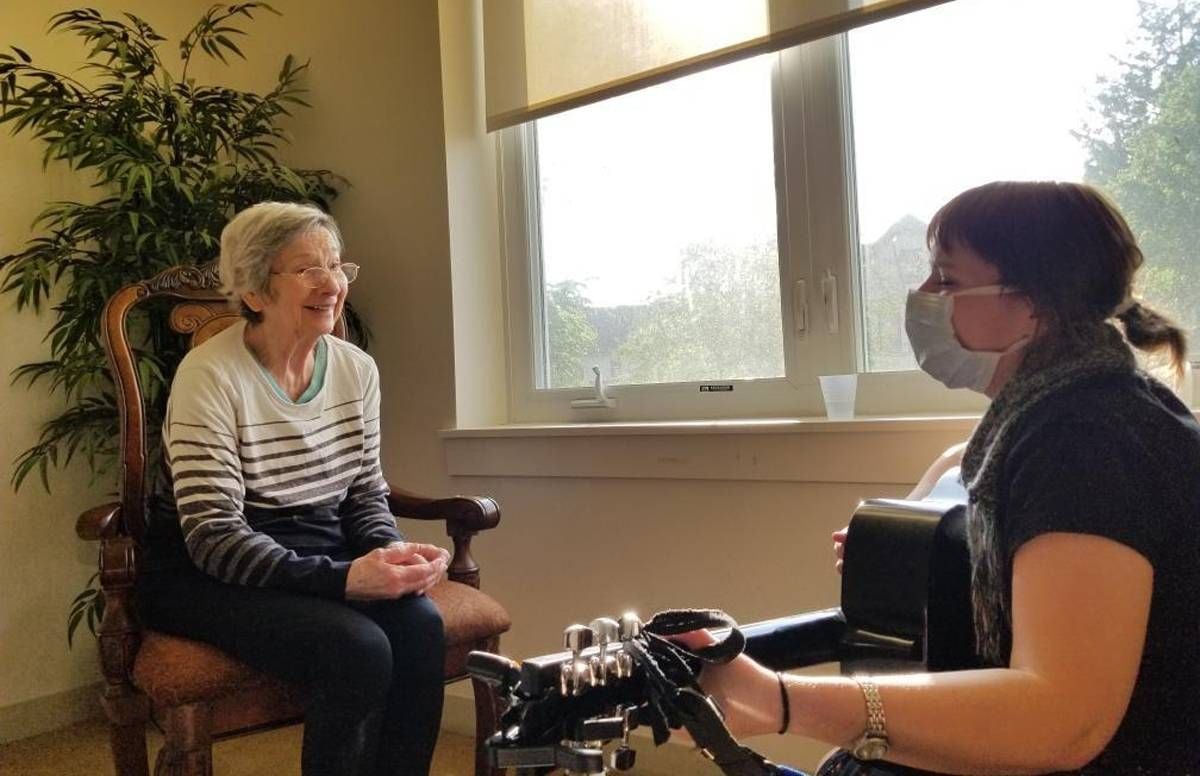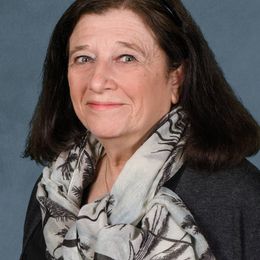The New Sound of Music Therapy in Long-Term Care
Music therapy can help calm and inspire people during COVID-19
When the pandemic hit, licensed music therapist Kimberly Williams had to adjust how she works with residents at Willow Gardens Memory Care, part of the United Hebrew of New Rochelle senior care community in New Rochelle, N.Y.

"We all want to feel connection, purpose and comfort. Our therapy sessions are designed to do that, whether with a large group or one-on-one. The sessions look different now, but they're still having an impact on our residents," Williams says.
Prior to the pandemic, Williams used to facilitate group activities with many residents and often encouraged sing-a-longs. Now, because singing has the potential to spread infectious coronavirus droplets, she has shifted to sensory interventions with small groups by providing strolling music, going room to room with her guitar and keyboard to engage and comfort each resident.
"We all want to feel connection, purpose and comfort."
Kathlynn Sell, a neurologic music therapist at several New England facilities, including Brookline Music School and the Walnut Street Center, says people respond best to the music they enjoyed between the ages of 18 and 25. "Those are some of our most formative years and it's the time period where the human brain completes its maturation process," she says.
Our Commitment to Covering the Coronavirus
We are committed to reliable reporting on the risks of the coronavirus and steps you can take to benefit you, your loved ones and others in your community. Read Next Avenue's Coronavirus Coverage.
"Think about your favorite music — when did you begin listening to it?" Sell asks. "That's the music we like to use in sessions with seniors, and that's the music that typically helps elicit memories. COVID-19 created an intense period of isolation for all of us in lockdown, especially seniors. If music can help to alleviate some of the feelings of isolation and sadness, then we've done our job."
The History of Music Therapy
Music as therapy is anything but new and has its roots in the writings of the Greek philosophers Aristotle and Plato. It was mentioned in a 1789 article in Columbian magazine, and in the early 1800s, was used in an institutional setting on New York City's Blackwell's Island, now known as Roosevelt Island.
More recently, after both World Wars, musicians would go to veterans hospitals to perform for patients with physical and mental disabilities.
Physicians and other heath care professionals soon realized the value of what these musicians were doing and believed they should have specific training to work with patients. In 1944, Michigan State University established the first academic program in music therapy. Others soon followed.
"If music can help to alleviate some of the feelings of isolation and sadness, then we've done our job."
For most of us, music is an important aspect of our lives. Our favorite songs can cheer us, bring tears to our eyes or help us during trying times.
People with dementia and other cognitive issues have similar memory clues when they hear music they remember, even though many might only respond with humming, foot tapping, nodding or clapping.
How Does Music Help Older Adults?
In a Stanford University School of Medicine study of 30 adults over the age of 80 with depression several years ago, researchers found that rhythmic music stimulates certain areas of the brain to increase blood flow and has improved older adults' performance on cognitive tests, says Keri Hook, director of Life Enrichment at Stella Maris.

Equally important, she adds, "Music therapy often is used in memory care treatment to slow the decline of speech skills in dementia patients. In some instances, music therapy can inspire individuals who are nonverbal to communicate by singing or humming."
Can family members and friends also play a part?
Ruth Busalacchi, a certified senior adviser and owner of Synergy HomeCare in Milwaukee, points out that music can be a time filler and a conversation starter. For families who can't see their loved ones but can visit virtually, they can use music to fill their visits with joy, instead of asking the same questions like "How did you sleep? and What did you have for dinner?"
When students in the Arizona State University music therapy program were unable to visit with their clients in neighboring care facilities and for at-home visits this spring, they decided to try something bold. With the direction of one of their instructors, Melita Belgrave, they created video sessions of their work for older adults and adults with traumatic brain injuries. The video sessions were posted on the Tempe Adult Day Health Care Services, a program of the Foundation for Senior Living.
Virtual music therapy is so new that there isn't much research on it, and it likely won't work for everyone or in every setting, says Belgrave.
"There are limitations when we can't make music together. You have to do interventions that are interactive — that will get something out of the client," Belgrave told ASU's Mary Beth Faller. "You have to be very intentional."
Music therapist Kathlynn Sell says all of her facilities' music therapy sessions are now remote. "As the pandemic continues, some of my sessions have begun exploring temporary outdoor music therapy with masks and large amounts of distance," she says
Most music therapists, she adds, "are counting down the days until we can be in-person once more. We will continue working to find safe and creative ways to let the music shine. Music will prevail, and we hope music will help others prevail, too."


